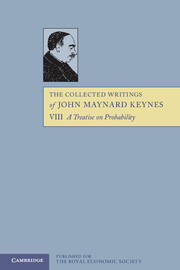Book contents
- Frontmatter
- Contents
- General Introduction
- Editorial Foreword by R. B. Braithwaite
- Editorial Note
- Preface to the First Edition
- I FUNDAMENTAL IDEAS
- 1 THE MEANING OF PROBABILITY
- 2 PROBABILITY IN RELATION TO THE THEORY OF KNOWLEDGE
- 3 THE MEASUREMENT OF PROBABILITIES
- 4 THE PRINCIPLE OF INDIFFERENCE
- 5 OTHER METHODS OF DETERMINING PROBABILITIES
- 6 THE WEIGHT OF ARGUMENTS
- 7 HISTORICAL RETROSPECT
- 8 THE FREQUENCY THEORY OF PROBABILITY
- 9 THE CONSTRUCTIVE THEORY OF PART I SUMMARISED
- II FUNDAMENTAL THEOREMS
- III INDUCTION AND ANALOGY
- IV SOME PHILOSOPHICAL APPLICATIONS OF PROBABILITY
- V THE FOUNDATIONS OF STATISTICAL INFERENCE
- Bibliography
- Index
3 - THE MEASUREMENT OF PROBABILITIES
from I - FUNDAMENTAL IDEAS
Published online by Cambridge University Press: 05 November 2012
- Frontmatter
- Contents
- General Introduction
- Editorial Foreword by R. B. Braithwaite
- Editorial Note
- Preface to the First Edition
- I FUNDAMENTAL IDEAS
- 1 THE MEANING OF PROBABILITY
- 2 PROBABILITY IN RELATION TO THE THEORY OF KNOWLEDGE
- 3 THE MEASUREMENT OF PROBABILITIES
- 4 THE PRINCIPLE OF INDIFFERENCE
- 5 OTHER METHODS OF DETERMINING PROBABILITIES
- 6 THE WEIGHT OF ARGUMENTS
- 7 HISTORICAL RETROSPECT
- 8 THE FREQUENCY THEORY OF PROBABILITY
- 9 THE CONSTRUCTIVE THEORY OF PART I SUMMARISED
- II FUNDAMENTAL THEOREMS
- III INDUCTION AND ANALOGY
- IV SOME PHILOSOPHICAL APPLICATIONS OF PROBABILITY
- V THE FOUNDATIONS OF STATISTICAL INFERENCE
- Bibliography
- Index
Summary
1. I have spoken of probability as being concerned with degrees of rational belief. This phrase implies that it is in some sense quantitative and perhaps capable of measurement. The theory of probable arguments must be much occupied, therefore, with comparisons of the respective weights which attach to different arguments. With this question we will now concern ourselves.
It has been assumed hitherto as a matter of course that probability is, in the full and literal sense of the word, measurable. I shall have to limit, not extend, the popular doctrine. But, keeping my own theories in the background for the moment, I will begin by discussing some existing opinions on the subject.
2. It has been sometimes supposed that a numerical comparison between the degrees of any pair of probabilities is not only conceivable but is actually within our power. Bentham, for instance, in his Rationale of Judicial Evidence, proposed a scale on which witnesses might mark the degree of their certainty; and others have suggested seriously a ‘barometer of probability’.
That such comparison is theoretically possible, whether or not we are actually competent in every case to make the comparison, has been the generally accepted opinion. The following quotation puts this point of view very well:
‘I do not see on what ground it can be doubted that every definite state of belief concerning a proposed hypothesis is in itself capable of being represented by a numerical expression, however difficult or impracticable it may be to ascertain its actual value.
- Type
- Chapter
- Information
- The Collected Writings of John Maynard Keynes , pp. 21 - 43Publisher: Royal Economic SocietyPrint publication year: 1978



